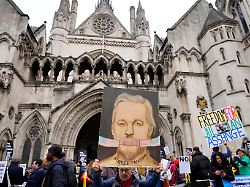Decision on extradition
Everything is at stake for Julian Assange
February 20, 2024, 11:16 a.m
One final hearing, after which the High Court in London will decide whether Julian Assange can lodge further appeals against his extradition to the USA. He faces up to 175 years in prison there. The wife of the Wikileaks founder fears for his life – and is already planning the next step.
Wikileaks founder Julian Assange is hoping for one last chance. At a court hearing in London this Tuesday and Wednesday, he wants to defend himself against extradition to the USA. If his application for an appeal to the High Court is not granted, legal recourse in Great Britain would be exhausted. The US Department of Justice wants to put the Australian on trial in the USA on espionage charges.
It was not clear until recently when exactly a decision would be made on the appeal. However, Assange’s wife Stella fears that the 52-year-old could be put on a plane to the USA within a few days, as she told journalists in London last week. If convicted in the United States, Assange faces up to 175 years in prison.
If his appeal in London is rejected, Assange’s only option would be to go to the European Court of Human Rights. Stella Assange announced that his team would immediately file an application for an interim injunction to prevent immediate extradition. However, there is concern that the British government could ignore such an order. She fears for his life because of the harsh prison conditions expected in the USA and her husband’s unstable psyche.
Whistleblower and enemy of the state
Washington accuses him of having, together with whistleblower Chelsea Manning, stolen and published secret material from US military operations in Iraq and Afghanistan, thereby endangering the lives of US informants. Assange’s lawyers argue that no one was harmed as a result. Supporters see Assange as a journalist who brought war crimes to light and who should now be made an example of. They consider the prosecution against him to be an attack on freedom of the press because Assange merely published the information leaked to him.
They called for demonstrations outside the Royal Courts of Justice on both days of the hearing. Supporters of Assange were already protesting there in the morning. Demonstrators waved placards reading “Freedom for Julian Assange” and chanted “There is only one decision: no deportation!”, as the British news agency PA reported. A march to the government headquarters at 10 Downing Street is also planned for Wednesday.
Human rights organizations and journalists’ associations around the world are campaigning for the 52-year-old’s release. Shortly before the start of the hearing in London, the chairwoman of the German Journalists’ Union (dju), Tina Groll, called for an end to the prosecution. By rejecting the US extradition request, the British judiciary could send an “unmistakable signal for basic democratic values,” said Groll. “Wikileaks played a significant role in ensuring that the world public learned about the dirty side of the US war operations,” emphasized the federal chairman of the German Journalists’ Association, Mika Beuster. “Julian Assange deserves awards for this, not imprisonment.”
A German lawyer also represents Assange
From his lawyer’s point of view, fundamental questions of press freedom are at stake in the proceedings. “It’s about how clearly and freely journalists can report in Europe when they report on possible misconduct by those in power,” said German lawyer Sören Schomburg, who is part of Assange’s team, to ZDF. What is at stake is whether journalists “take the risk of being extradited to the USA or other states, or whether the states in Europe take a clear position here and speak out against it,” Schomburg continued.
The Australian has been in London’s Belmarsh high-security prison since his arrest in April 2019. He had previously evaded law enforcement authorities for several years in the Ecuadorian embassy in the British capital. They initially targeted him because of rape allegations in Sweden. However, these allegations were later dropped due to lack of evidence.
In addition to success in the legal tug-of-war, Assange is hoping for a political solution. The Australian government is now campaigning for the release of its citizen. Just last week, the Australian Parliament passed a resolution calling on the USA and Great Britain to end the prosecution of Assange. Prime Minister Anthony Albanese emphasized that the matter had been dragging on for too long. However, US Secretary of State Antony Blinken has repeatedly rejected calls for an end to criminal prosecution.
